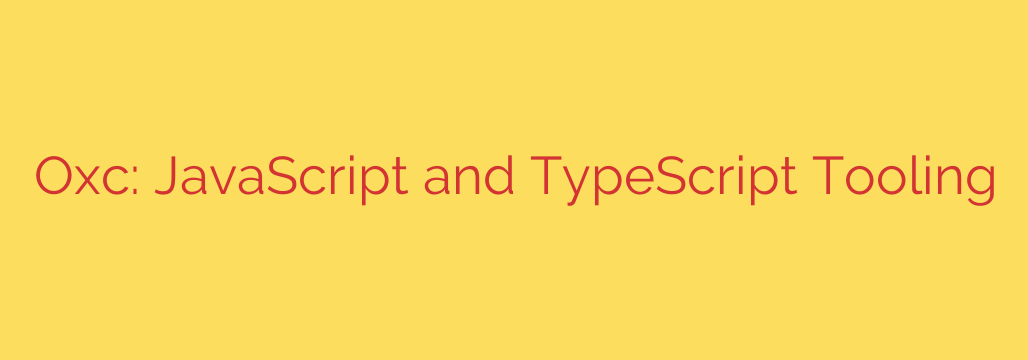
Oxc: The High-Performance JavaScript & TypeScript Toolchain Written in Rust
Are slow build times, sluggish linting, and lagging feedback loops holding your JavaScript project back? As applications and codebases grow in complexity, the tools we rely on—often written in JavaScript themselves—can become a significant bottleneck. This frustration is a shared experience for many developers, but a new wave of high-performance tooling is emerging to solve it.
Enter Oxc, a revolutionary collection of JavaScript and TypeScript tools written from the ground up in Rust. By leveraging the raw power and memory safety of a low-level language, Oxc delivers a monumental leap in performance, aiming to make your development workflow faster and more efficient than ever before.
Why Your JavaScript Tooling Feels Slow
For years, the JavaScript ecosystem has thrived on tools built with JavaScript. While this approach offers excellent accessibility and a vast talent pool, it comes with inherent performance limitations. Interpreted languages like JavaScript simply can’t match the speed of compiled languages like Rust for CPU-intensive tasks like parsing, transforming, and analyzing code.
Every time you run a linter, bundler, or transpiler, these tools must first parse your code into an Abstract Syntax Tree (AST) before they can do their job. When multiple tools are chained together in a build process, this parsing step is often repeated, compounding the slowdown.
Introducing Oxc: A Paradigm Shift in Performance
Oxc (Oxidation Compiler) is not just a single tool but an entire toolchain designed for extreme speed and efficiency. Its core philosophy is to provide a cohesive suite of development utilities that are not only individually fast but also work together seamlessly.
The secret to its speed is twofold:
- It’s written entirely in Rust. Rust provides near-native performance, eliminates entire classes of bugs through its strict compiler, and allows for safe, concurrent processing. This means Oxc can handle massive codebases at a fraction of the time it takes traditional tools. Early benchmarks show it can be 50 to 100 times faster than its JavaScript-based counterparts.
- It uses a unified architecture. All Oxc tools share the same core parser and AST representation. This means your code is parsed only once, and the resulting tree is then passed to the linter, minifier, or any other tool in the chain. This eliminates redundant work and dramatically speeds up complex build pipelines.
What’s Inside the Oxc Ecosystem?
Oxc provides a comprehensive set of foundational tools that aim for compatibility with the existing JavaScript ecosystem, making adoption as smooth as possible.
- Oxc Parser: A highly performant, specification-compliant parser that forms the foundation of the entire toolchain. It handles JSX and TypeScript syntax out of the box.
- Oxc Linter: An incredibly fast linter designed for ESLint compatibility. The goal is to provide parity with popular ESLint rules, allowing teams to migrate without rewriting their entire configuration.
- Oxc Resolver: A module resolver that functions similarly to Webpack’s
enhanced-resolvebut with a significant speed advantage. - Oxc Transformer: A tool for transforming code, serving as a high-speed alternative to Babel for common transpilation tasks.
- Oxc Minifier: A code minifier built to shrink your bundle sizes quickly and efficiently.
- Oxc Formatter: A code formatter to ensure consistent style across your entire project.
Core Advantages of Building with Oxc
Adopting a new toolchain is a significant decision. Here are the key benefits that make Oxc a compelling choice for modern web development:
- Blazing-Fast Speed: Drastically reduce build times in your CI/CD pipelines and get near-instant feedback from your linter and formatter during local development.
- Seamless Ecosystem Compatibility: Oxc is not trying to reinvent the wheel. By aiming for drop-in compatibility with tools like ESLint, it lowers the barrier to entry and allows for a gradual transition.
- Enhanced Developer Experience: Faster tools mean less waiting and more doing. A responsive development environment keeps you in the flow state, boosting productivity and reducing frustration.
- Reliability and Memory Safety: Built with Rust, Oxc is inherently more robust and less prone to memory-related errors that can plague large-scale JavaScript applications.
Who is Oxc For?
While any developer can benefit from faster tooling, Oxc is particularly transformative for:
- Teams with large-scale monorepos: The performance gains are most pronounced when dealing with millions of lines of code.
- Projects with slow CI/CD pipelines: Slashing build and linting times from minutes to seconds can significantly accelerate deployment frequency.
- Framework and tool authors: Oxc provides a high-performance foundation for building the next generation of bundlers, compilers, and development environments.
- Any developer tired of waiting for their tools to catch up.
The rise of tools like Oxc marks a pivotal moment for web development. By moving the foundational infrastructure of our ecosystem to high-performance compiled languages, we are paving the way for a faster, more reliable, and ultimately more enjoyable development experience.
Source: https://www.linuxlinks.com/oxc-tools-javascript-typescript/








